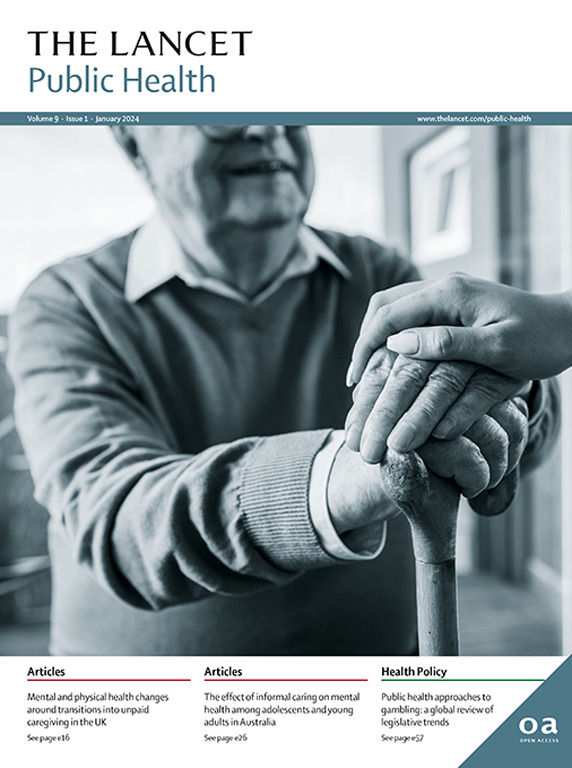Improving implementation of needle and syringe programmes to expand, scale up, and sustain evidence-based prevention interventions for HIV and hepatitis C in prisons
IF 25.4
1区 医学
Q1 PUBLIC, ENVIRONMENTAL & OCCUPATIONAL HEALTH
引用次数: 0
Abstract
The 1990 resolution by the UN General Assembly committed member states to provide health-care equity for people in prison, who are included in the global goals to control HIV and eliminate hepatitis C virus (HCV) by 2030. WHO has set ambitious HCV elimination targets by including people who inject drugs (PWID), yet has not prioritised PWID who are incarcerated, a substantial population who have or are at risk for HCV infection. Human rights principles of health-care equity stipulate that “prisoners should enjoy the same standards of health care that are available in the community, without discrimination on the grounds of their legal status”. Globally, only nine countries provide prison-based needle and syringe programmes (PNSPs), essential evidence-based interventions to holistically reduce the harms from drug use, of which only three countries extend reach to all prisons. Even where available, these services are accessed by few participants. PNSPs are recommended as an essential element of an effective HIV and HCV prevention strategy in prisons, and studies have shown that they are key to achieving HCV elimination in carceral settings. This Viewpoint, based primarily on unpublished data from key country-level stakeholders and expert opinion, highlights our perspective that implementation factors related to PNSP delivery in diverse settings likely contribute to low adoption and use of these services by PWID in prisons compared with in the community. However, successful expansion of these evidence-based interventions will depend on political commitment, national surveillance and monitoring programmes, and state-of-the-art implementation science methods, where inputs from multilevel stakeholders should guide improved implementation. Policy makers are urged to create and support opportunities to scale up PNSPs within countries where they exist and expand them to other countries where they are needed to solidify years of commitment towards the 2030 HCV elimination goals.改进针头和针筒方案的实施,以扩大、加强和维持监狱中基于证据的艾滋病毒和丙型肝炎预防干预措施
联合国大会1990年通过的决议要求会员国为监狱服刑人员提供公平的医疗保健服务,这被纳入到2030年控制艾滋病毒和消除丙型肝炎病毒(HCV)的全球目标中。世卫组织制定了雄心勃勃的消除丙型肝炎病毒目标,包括注射吸毒者,但没有优先考虑监禁的注射吸毒者,这是一个已经或有丙型肝炎病毒感染风险的大量人群。卫生保健平等的人权原则规定,“囚犯应享有与社区相同的卫生保健标准,不得因其法律地位而受到歧视”。在全球范围内,只有9个国家提供以监狱为基础的针头和注射器规划(PNSPs),这是全面减少吸毒危害的基本循证干预措施,其中只有3个国家将其推广到所有监狱。即使在可用的情况下,也只有少数参与者访问这些服务。建议将PNSPs作为监狱中有效预防艾滋病毒和丙型肝炎病毒战略的基本要素,研究表明它们是在监狱环境中实现消除丙型肝炎病毒的关键。这一观点主要基于来自关键国家层面利益相关者的未公布数据和专家意见,强调了我们的观点,即与在不同环境中提供PNSP相关的实施因素可能导致监狱中的PNSP与社区中的PNSP相比使用率较低。然而,这些以证据为基础的干预措施的成功推广将取决于政治承诺、国家监督和监测规划以及最先进的实施科学方法,多层次利益攸关方的投入应指导改进实施。敦促政策制定者创造和支持机会,在已有规划的国家扩大规划,并将其扩大到需要规划的其他国家,以巩固多年来对2030年消除丙型肝炎病毒目标的承诺。
本文章由计算机程序翻译,如有差异,请以英文原文为准。
求助全文
约1分钟内获得全文
求助全文
来源期刊

Lancet Public Health
Medicine-Public Health, Environmental and Occupational Health
CiteScore
55.60
自引率
0.80%
发文量
305
审稿时长
8 weeks
期刊介绍:
The Lancet Public Health is committed to tackling the most pressing issues across all aspects of public health. We have a strong commitment to using science to improve health equity and social justice. In line with the values and vision of The Lancet, we take a broad and inclusive approach to public health and are interested in interdisciplinary research.
We publish a range of content types that can advance public health policies and outcomes. These include Articles, Review, Comment, and Correspondence. Learn more about the types of papers we publish.
 求助内容:
求助内容: 应助结果提醒方式:
应助结果提醒方式:


